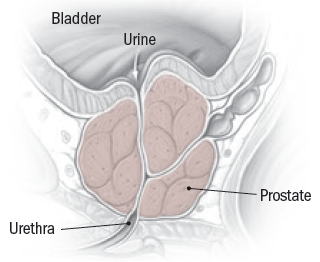The growing problem of an enlarged prostate gland
The most common prostate problem among men over age 50, this condition can cause annoying urination issues.
By age 60, half of all men will have an enlarged prostate, a condition also known as benign prostatic hyperplasia, or BPH. By age 85, the proportion reaches 90%.
While BPH does not increase your risk of getting prostate cancer or having sexual problems, it can affect quality of life, specifically by causing annoying and embarrassing urination problems.
"Since prostate enlargement happens gradually, men often think more frequent trips to the bathroom are a natural part of aging," says Dr. Howard LeWine, chief medical editor at Harvard Health Publishing and an assistant professor of medicine at Harvard-affiliated Brigham and Women's Hospital. "But a little medication can help relieve symptoms, meaning less urinary urgency and fewer nighttime awakenings to use the bathroom."
Benign prostatic hyperplasia
An enlarged prostate places pressure on the urethra, which makes urine harder to expel. |
Feeling the pressure of an enlarged prostate
As you age, your prostate can grow from the size of a walnut to about the size of a lemon. It's not clear why the prostate grows like this, but it's believed certain male hormones such as dihydrotestosterone tend to act more strongly on the prostate gland later in life.
Because the prostate is located just below the bladder, when it becomes larger it can place pressure on the urethra, the tube that carries urine from the bladder through the penis and out of the body. This may lead to a variety of urination problems.
For example, you may have trouble beginning to urinate, continue to dribble afterward, and feel like you have not fully emptied your bladder. Urine that doesn't get expelled and collects in the bladder can increase the risk of infection, which in turn makes it painful to urinate and causes even more bathroom trips and potentially loss of bladder control. Urinary tract (or bladder) infections can also lead to a kidney infection.
Possible cancer protection from prostate drugsEarly research suggested that 5-alpha-reductase inhibitors (5-ARIs), a class of drugs used to treat prostate enlargement, might increase the risk of developing more aggressive prostate cancer. However, newer studies have found that not only do the drugs appear to pose no extra risk, they may even protect against prostate cancer. For instance, research from the Prostate Cancer Prevention Trial study in 2013 showed that taking the 5-ARI finasteride (Proscar) for seven years could lower the chance of getting low-grade prostate cancer by 25% among men ages 55 and older. A follow-up study of almost 9,500 men, published in the Nov. 1, 2018, issue of the Journal of the National Cancer Institute, also showed that finasteride lowered the risk by a similar amount (21%), and found the protective effect lasted for at least 16 years. |
Drug treatment options for BPH
See your doctor if you have any of these problems. A digital rectal exam can often confirm an enlarged prostate, and your doctor may take a urine sample to check for a bladder infection that can be treated with antibiotics.
If your enlarged prostate is causing symptoms, your doctor will likely offer you medication to improve and manage them. Two main classes of drugs are used: alpha blockers and 5-alpha-reductase inhibitors (5-ARIs). Your doctor may prescribe one or both types, depending on your symptoms and the size of your prostate gland.
Alpha blockers. These drugs relax the muscles around the prostate and the opening of the bladder, so urine can flow more easily. Common BPH symptoms often improve within two days. They are most effective for men with minimally to moderately enlarged prostates. Commonly prescribed drugs in this class include alfuzosin (Uroxatral), silodosin (Rapaflo), and tamsulosin (Flomax).
5-ARIs. Drugs in this class slowly shrink the prostate so it stops pressing on the urethra. Treatment often reduces the prostate's size by one-quarter after six months to a year. The two common drugs are finasteride (Proscar) and dutasteride (Avodart).
Men might opt for surgery to remove excess tissue from the prostate if medications do not relieve symptoms sufficiently or cause undesirable side effects, or if there are complications like urinary retention or recurring urinary tract infections, adds Dr. LeWine.
For men who have both erectile dysfunction and symptoms of BPH, once-daily low-dose tadalafil (Cialis) is another option.
Disclaimer:
As a service to our readers, Harvard Health Publishing provides access to our library of archived content. Please note the date of last review or update on all articles.
No content on this site, regardless of date, should ever be used as a substitute for direct medical advice from your doctor or other qualified clinician.
















